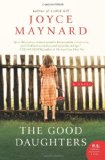Summary | Excerpt | Reading Guide | Reviews | Beyond the Book | Readalikes | Genres & Themes | Author Bio

A Novel
by Joyce Maynard
One spring Ray Dickerson built a homemade unicycle using a few old bike
parts he’d found at the dump. That was Ray for you. When other boys were out
on the ball field, he rode that contraption around town playing his harmonica.
At one point, he’d tried to teach his sister how to ride the unicycle, and
Dana had taken a fall bad enough that her arm ended up in a sling. You’d think
Mrs. Dickerson would have confiscated the thing after that—or that she’d be
upset at least, but it didn’t seem to bother her, though my mother had a fit.
Not much bothered Val Dickerson, or appeared to. She was an artist, and
generally absorbed in that more than whatever might be going on with her children,
was my impression. Where my mother kept close tabs on every single
thing my sisters and I did, Val Dickerson would disappear into a room she called
her studio for hours at a time, leaving Dana and Ray with an enormous bowl of
dry Cheerios and some odd assignment like “go put on a play” or “see if you can
find a squirrel and teach him to do tricks.” The strange thing was, they might.
When Ray talked to animals, they seemed to listen.
My father couldn’t ever take time off in summer, because of all the jobs that
needed doing at our farm, but my mother established a tradition of making a
road trip every year during February vacation, when there wasn’t so much that
needed doing on the farm, and what there was he could, reluctantly, trust to his
helper, a small, wiry boy by the name of Victor Patucci who’d first shown up at
our door when he was only fourteen or so, looking for work. Victor was about
as unlikely a person as you could have chosen to be a farmer—a smoker, who
wore so much Brylcreem his hair reflected light, who followed race car driving
and turned up his transistor radio whenever they played an Elvis Presley song,
and never seemed to go to school. His father worked in the shoe factory, and
my father said he wasn’t a good man—words that stood out for me because my
father so seldom spoke ill of anyone.
“The boy could use a helping hand,” my father said when he’d signed Victor
up—and though initially my mother protested the thirty-dollar-a-week
expense, it was Victor’s presence on our farm that made our annual Dickerson
visit possible, and for that she was thankful.
So every March we set out to see the Dickersons. Before embarking on our
road trip, my mother filled a cooler with sandwiches and jars of peanut butter
and things like beef jerky that didn’t go bad. Then my sisters and I would pile
into the backseat of our old Country Squire station wagon with the fake wood
paneling and a stack of coloring books and Mad Libs to keep us busy. We’d play
I Spy or look for license plates from unusual states and now and then we’d stop at
battlefields and historic monuments, and sometimes a museum, but our ultimate
destination was whatever run-down house or trailer (and one time, a converted
Quonset hut) the Dickersons were living in that year.
The point of this, as always, was what my mother imagined to be my attachment
to Dana Dickerson, but for me, the one significant attraction of the trip
was knowing I’d get to see Ray Dickerson.
Young as I was, I understood he was handsome, and the knowledge of that
made me shy, though I was drawn to him too. The odd thing was that even
when I was very young—eight or nine, and he twelve or thirteen—he seemed
to take an interest in me over my sisters. On one of our visits, he had spotted a
drawing I’d made in the car, of a camel I’d copied off an empty cigarette pack I’d
found—only I added a man dressed like Lawrence of Arabia riding on it, and a
girl tied up, like a prisoner, on the camel’s other hump.
“Cool picture,” he said. “I’ll give you a Lifesaver for it.”
Excerpted from The Good Daughters by Joyce Maynard. Copyright © 2010 by Joyce Maynard. Excerpted by permission of William Morrow. All rights reserved. No part of this excerpt may be reproduced or reprinted without permission in writing from the publisher.
Your guide toexceptional books
BookBrowse seeks out and recommends the best in contemporary fiction and nonfiction—books that not only engage and entertain but also deepen our understanding of ourselves and the world around us.